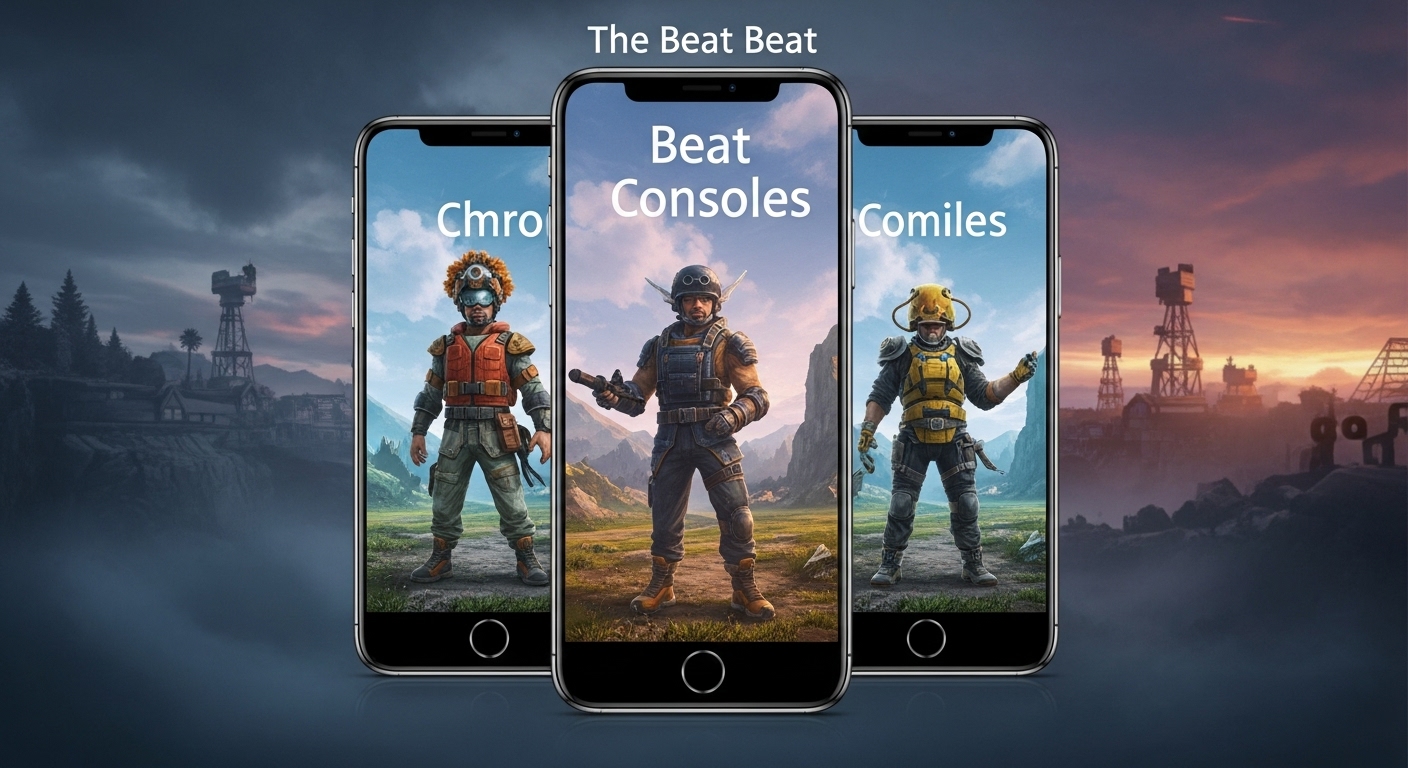Introduction to the Evolution of Mobile Gaming
In the last two decades, mobile gaming has transitioned from simple puzzle titles like Snake and Tetris to high-quality experiences that rival console and even PC games. The rise of smartphones with powerful processors, high-resolution displays, and advanced graphics capabilities has pushed the boundaries of what was once thought possible on handheld devices. Where consoles once reigned supreme in terms of immersive gameplay, rich storylines, and graphical fidelity, many mobile titles today stand toe to toe with some of the most acclaimed console games. This evolution has changed the perception of mobile gaming from a casual pastime to a serious platform capable of delivering premium-quality experiences.
The Power of Modern Smartphones
One of the primary reasons mobile games now rival console quality is the sheer technological advancement of smartphones. Devices from companies like Apple, Samsung, and Xiaomi are equipped with chipsets that rival gaming laptops in performance. GPUs such as the Apple A17 Pro and Qualcomm Snapdragon 8 Gen 3 can render realistic graphics, smooth frame rates, and ray tracing effects that were previously limited to consoles like PlayStation or Xbox. With larger RAM sizes, advanced cooling systems, and AI-driven optimization, mobile devices now provide the horsepower needed for console-quality gaming experiences. As a result, developers have embraced this capability to design visually stunning games with deep mechanics.
Changing Player Expectations
Another reason mobile games have reached console quality lies in shifting player expectations. Mobile gamers no longer accept simplistic mechanics or shallow gameplay. The audience has matured, and players demand the same depth, realism, and engagement found on consoles. This demand has led developers to create games with cinematic narratives, expansive open worlds, and multiplayer systems that rival console titles. Developers also prioritize optimizing controls for touch screens, adding customizable gamepads, or offering compatibility with Bluetooth controllers, bridging the gap between handheld and traditional gaming.
The Influence of Cloud Gaming and Streaming
Cloud gaming has significantly boosted the quality perception of mobile gaming. Platforms such as Xbox Cloud Gaming, GeForce Now, and PlayStation Remote Play allow gamers to access AAA console titles directly from their mobile devices without requiring heavy downloads or large storage capacities. This has blurred the lines between console and mobile experiences since players can enjoy the exact same game on their phone as they do on their living room console. Cloud gaming has made it possible for mobile devices to serve as a window into next-gen quality, providing access to advanced titles that maintain console fidelity.
Genshin Impact as a Benchmark
One of the most cited examples of a mobile game surpassing console expectations is Genshin Impact. Released by miHoYo, this free-to-play action RPG delivers an expansive open world, stunning graphics, and an immersive storyline that rivals console classics like The Legend of Zelda: Breath of the Wild. With its breathtaking landscapes, fluid combat system, and frequent updates introducing new content, Genshin Impact has redefined what gamers expect from mobile titles. Its success also illustrates how mobile gaming can accommodate both casual and hardcore players, making it a global phenomenon that stands shoulder to shoulder with the best console RPGs.
Call of Duty Mobile and Competitive Shooter Standards
First-person shooters have always been considered the domain of consoles and PCs, but Call of Duty Mobile changed the narrative. Developed by Activision and Tencent, it delivers console-quality maps, weapons, and modes directly to smartphones. From iconic maps like Nuketown to battle royale experiences, the game provides a smooth and responsive shooter experience optimized for touch controls but also compatible with controllers. Its graphics and fluid gameplay prove that mobile platforms can handle competitive shooters just as well as consoles, with millions of players worldwide proving its legitimacy in the esports arena.
PUBG Mobile and the Rise of Battle Royale
Another title that demonstrates console-quality gaming on mobile is PUBG Mobile. Known for pioneering the battle royale genre in the mobile space, PUBG Mobile has delivered an expansive online experience that mirrors and sometimes exceeds its PC and console versions. The large maps, realistic weapon mechanics, and intense multiplayer matches highlight how mobile platforms can sustain massive online communities. Moreover, PUBG Mobile esports tournaments attract millions of viewers globally, showcasing that mobile games can dominate the competitive gaming landscape just as effectively as console titles.
Fortnite’s Cross-Platform Innovation
Fortnite has become a household name across all gaming platforms, but its presence on mobile has been groundbreaking. Epic Games ensured that the mobile version retained the same mechanics, graphics, and cross-platform play as its console counterparts. The ability to play with friends across Xbox, PlayStation, and PC while on a smartphone sets a new standard for connectivity and performance. Though legal disputes temporarily restricted its presence on certain app stores, Fortnite Mobile still represents a pinnacle of mobile gaming innovation and console-quality performance.
Asphalt Series and Racing Game Excellence
Racing games on mobile have reached a level of visual and mechanical polish that astonishes players. The Asphalt series by Gameloft, particularly Asphalt 9: Legends, demonstrates stunning car models, realistic physics, and cinematic race tracks that rival console titles like Forza Horizon. The ease of accessibility combined with jaw-dropping visuals makes Asphalt a clear example of how mobile racing games can deliver experiences on par with or exceeding console games.
The Role of Augmented Reality in Mobile Gaming
While consoles have dabbled in virtual reality, mobile devices have taken a unique route through augmented reality. Titles like Pokémon GO and Harry Potter: Wizards Unite leverage smartphone cameras and GPS to deliver immersive experiences that consoles cannot replicate. These games blur the line between physical and digital worlds, offering a unique quality that consoles cannot compete with. By creating new genres of gameplay that combine real-world exploration with virtual mechanics, AR games elevate mobile devices into platforms capable of delivering groundbreaking innovations.
The Importance of Game Engines
Game engines like Unity and Unreal Engine have significantly contributed to the rise of console-quality mobile games. These engines empower developers to create high-quality visuals, realistic physics, and expansive worlds while optimizing them for smartphones. Unreal Engine, in particular, has allowed developers to port console-quality graphics directly to mobile platforms without losing fidelity. As a result, mobile games no longer feel like watered-down versions of their console counterparts but instead stand as equals.
Monetization Without Compromising Quality
One key aspect of mobile games beating console quality is their approach to monetization. While console games often come with a premium price tag, many mobile games adopt a free-to-play model supported by in-game purchases. The challenge has always been balancing monetization with gameplay integrity. Successful titles like Genshin Impact and Call of Duty Mobile demonstrate that it is possible to deliver console-quality experiences without sacrificing quality for profit. These games attract massive audiences because they offer top-tier experiences at no upfront cost, something that consoles cannot always replicate.
Expanding Storytelling in Mobile Games
Narrative-driven experiences are often associated with consoles, but mobile developers are increasingly investing in rich storytelling. Games like Life is Strange and Sky: Children of the Light demonstrate that mobile platforms can deliver emotional, story-rich experiences. These games prove that storytelling, once thought to be console-exclusive, can thrive in mobile ecosystems when paired with high production values and creative design. The ability to engage players emotionally enhances the credibility of mobile games as equals to console titles.
Esports and the Competitive Edge
Mobile esports have rapidly grown into billion-dollar industries, challenging the dominance of console and PC competitions. Titles like PUBG Mobile, Free Fire, and Arena of Valor host tournaments that draw massive global audiences, rivaling console esports events. The accessibility of mobile gaming—since most people own smartphones—ensures a wider player base, giving mobile games an advantage in reach and influence. This competitive scene highlights how mobile titles are not just matching but in many ways surpassing console games in terms of global impact.
Global Accessibility and Market Growth
Another factor that sets mobile games apart is their accessibility. While consoles require expensive hardware and dedicated setups, mobile devices are widespread and affordable, particularly in emerging markets. This accessibility ensures that console-quality experiences reach millions more players through mobile gaming than through traditional console ecosystems. As developers continue to target these markets, the global influence of mobile games will only grow stronger.
The Future of Mobile Games Surpassing Consoles
Looking ahead, the line between mobile and console gaming will blur even further. With advancements in 5G connectivity, augmented and virtual reality, and AI-driven game design, mobile games are set to surpass consoles in innovation, accessibility, and market reach. Developers are increasingly treating mobile platforms as primary development targets rather than secondary adaptations, ensuring that future titles deliver console-quality and beyond.
Conclusion: The End of the Divide
The debate between mobile and console gaming is no longer about which platform offers better quality. Instead, it is about recognizing that mobile games have already achieved and, in many ways, surpassed console-level experiences. From titles like Genshin Impact and Call of Duty Mobile to innovations in AR and cloud gaming, mobile platforms deliver immersive, visually stunning, and competitive experiences once thought exclusive to consoles. As technology continues to advance and developers push boundaries, mobile games are no longer just catching up—they are leading the way into the future of gaming.

